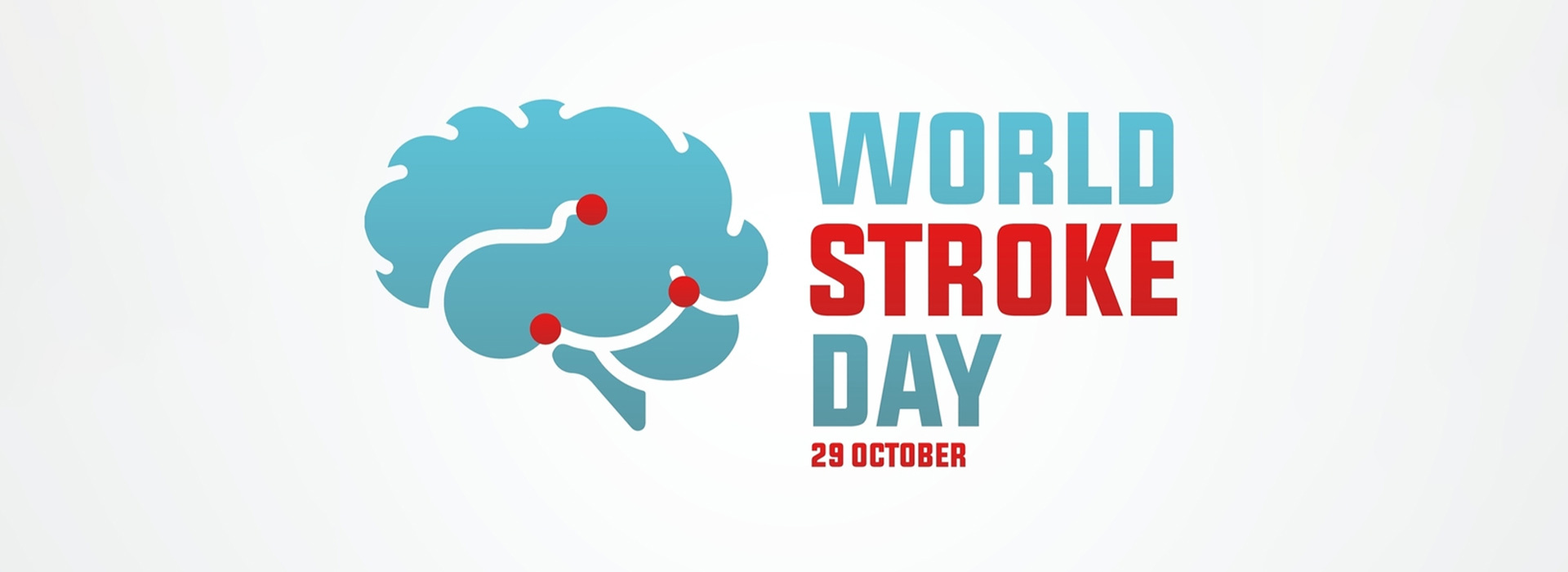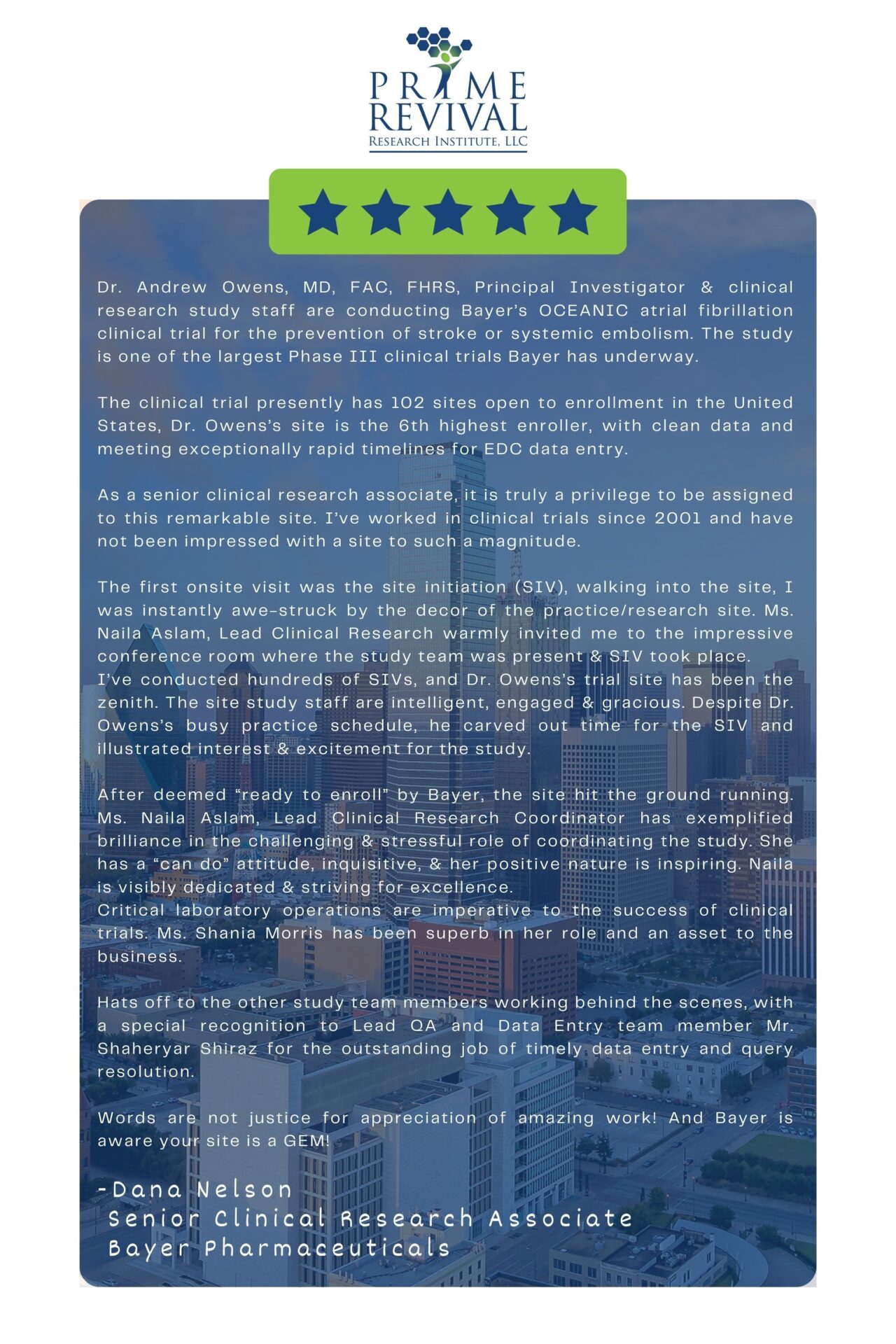Last Updated on October 27, 2023

World Stroke Day 2023
High blood pressure, irregular heartbeat (atrial fibrillation), smoking, diet, and exercise are the common risk factors behind 90% of those affected by stroke. Of all the conditions, stroke and heart failure are the most common complications of untreated AFib. The occurrence of stroke is common in about 1 in 4 people. Like every year, World Stroke Day 2023 happens in October and reminds us to spread awareness about preventive measures and healthy lifestyle interventions to reduce the risk of stroke. Every minute is crucial and matters when it comes to treating stroke individuals.
Prime Revival fosters awareness through informative posts and actively addresses community needs through the execution of cardiology clinical trials. In Texas, we’re currently engaged in clinical trials focused on AFib, with a primary goal of addressing stroke, a prevalent risk factor associated with this condition.
Delve into the blog to learn more about the causes of stroke, the consequences of leaving heart conditions untreated, and preventive measures to reduce the risk of stroke.
Remembering This World Stroke Day 2023: Heart Conditions & Stroke
Heart conditions and stroke share many risk factors, closely interconnected and interdependent on one another. Here is an overview of their relationship.
- Atherosclerosis: The plaque buildup in the coronary arteries is the common cause of heart conditions. Whereas plaque buildup in the carotid and cerebral arteries results in stroke.
- Blood Clots: In the case of a heart condition, a blood clot can block a coronary artery, resulting in a heart attack. On the contrary, when a clot travels to the brain and obstructs a blood vessel, it leads to an ischemic stroke.
- Arrhythmias: In AFib, the heart’s irregular rhythm may cause blood to pool in the atria, increasing the likelihood of clot formation. These clots can then dislodge and travel to the brain, causing a stroke.
- Congestive Heart Failure: CHF affects the heart’s ability to pump blood, which causes blood pooling in the circulatory system and increases the risk of clot formation. The clot, if dislodged, may lead to a stroke.
Also read: Improving AFib Life Expectancy
A comprehensive approach to cardiovascular health involves addressing these common factors through lifestyle changes, medical management, and, in some cases, surgical interventions. Individuals need to work closely with healthcare professionals to assess their risk profiles, receive proper guidance, and take necessary steps to reduce the risk of heart conditions and stroke.
Stroke Symptoms
The symptoms commonly suggestive of stroke are:
- Sudden, unilateral numbness or weakness in the face, arm, or leg
- Sudden confusion or dizziness
- Trouble speaking
- Trouble in vision
- Difficulty walking or loss of balance
- Lack of coordination
Prevention Is Greater Than Stroke: World Stroke Day 2023’s Theme
In 2023, the theme “Prevention Is Greater Than Stroke” takes center stage, highlighting the critical role of prevention in mitigating the devastating effects of stroke.
Stroke is a leading cause of disability and mortality worldwide that occurs suddenly, with little or no warning. It is a medical condition that affects anyone, regardless of age, gender, or background. While advancements in clinical research have improved stroke treatment and rehabilitation, to date, the best approach to address stroke is prevention.
At the forefront of all preventive measures for stroke lies awareness. Recognizing the risk factors and early warning signs of stroke is essential. High blood pressure, smoking, obesity, diabetes, and an unhealthy diet are some of the attention-worthy risk factors. Lifestyle modifications, such as a healthier diet, increased physical activity, and quitting smoking, significantly reduce the risk of stroke. In addition, regular medical check-ups and blood pressure monitoring are crucial in identifying and managing risk factors.
Prime Revival’s Initiatives For Cardiovascular Disease Prevention and Treatment
Besides risk awareness and lifestyle modifications, stroke prevention extends to education and public health campaigns. These initiatives are vital in raising awareness and promoting healthy behaviors. Prime Revival and other clinical research organizations in Texas, and the medical community including physicians, nurses, and researchers, play a pivotal role in disseminating knowledge, emphasizing the importance of regular health check-ups, medication adherence, and risk factor management, underscoring the idea that prevention is indeed greater than stroke.
Our team of physicians and researchers hold a thorough understanding of the pathophysiology of AFib, stroke, and other cardiac conditions, which helps reduce their incidence. Under our cardiology clinical trials, innovative medications, interventions, and medical devices are investigated to address stroke risk factors, such as high blood pressure and atrial fibrillation.
Stroke Prevention From The Physician’s Perspective
Clinical Trials in the field of stroke help expedite the delivery of potential novel treatments. The unwavering contribution of physicians and researchers in clinical trials has been instrumental in reducing the burden of stroke globally.
From a physician’s perspective, stroke prevention begins with personalized care. Every patient is unique, and their risk factors and healthcare require individual attention. This requires the physicians and patients to collaborate to develop individualized prevention strategies after taking into account their medical history, lifestyle, and any preexisting conditions.
Through their expertise and guidance, physicians serve as catalysts for positive change, empowering patients to take ownership of their health.
The Takeaway
In conclusion, World Stroke Day 2023 underscores the pivotal role of prevention in reducing the global burden of stroke. From a physician’s perspective, prevention is not just a concept; it’s a daily commitment to their patients’ well-being. By raising awareness, conducting research, and advocating for healthy choices, physicians are helping individuals make informed decisions to reduce their risk of stroke. The message is clear: “Prevention Is Greater Than Stroke.” Through collective efforts and unwavering dedication, we can work towards a world where stroke is no longer a leading cause of disability and death.


